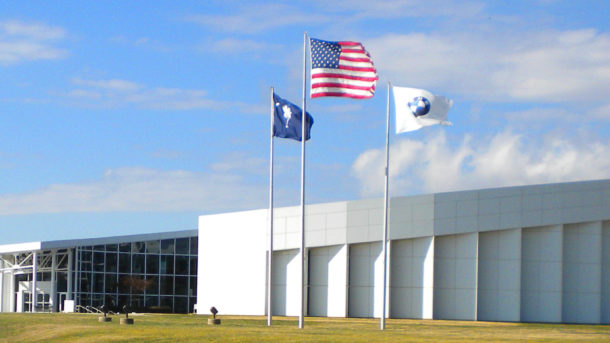NLRB's Roach Motel
You have to figure that the brain trusts at the National Labor Relations Board didn’t think about the impact that their efforts to punish companies that move to Right to Work states would have on non-Right to Work states. But…
You have to figure that the brain trusts at the National Labor Relations Board didn’t think about the impact that their efforts to punish companies that move to Right to Work states would have on non-Right to Work states. But…

From the National Right To Work Legal Defense Foundation: Worker Advocate Blasts Labor Board Ruling to Allow Charleston Workers Minimal Say in Boeing Case Big Labor watchdog slams ruling as insufficient; ploy to quietly sweep workers’ stories under the rug Washington, DC (June 20, 2011) – The National Labor Relations Board (NLRB) in Washington, D.C. has ruled three Charleston-area Boeing Company (NYSE: BA) employees are allowed to intervene, albeit minimally, in the NLRB’s high-profile case against Boeing. With free legal assistance from the National Right to Work Foundation, North Charleston Boeing employees Dennis Murray, Cynthia Ramaker, and Meredith Going, Sr. filed a motion earlier this month to intervene in the NLRB’s unprecedented case targeting the company for locating production of some of its 787 Dreamliner airplanes in South Carolina, in part due to its popular Right to Work law. An NLRB Administrative Law Judge in San Francisco denied the workers’ request and the workers were forced to file an emergency appeal with the national Board in Washington, D.C. The Board in D.C. has ruled that the employees can only file a brief in the case once the hearings, occurring in Seattle, Washington, are concluded.

From the National Right To Work Legal Defense Foundation: Worker Advocate Blasts Labor Board Ruling to Allow Charleston Workers Minimal Say in Boeing Case Big Labor watchdog slams ruling as insufficient; ploy to quietly sweep workers’ stories under the rug Washington, DC (June 20, 2011) – The National Labor Relations Board (NLRB) in Washington, D.C. has ruled three Charleston-area Boeing Company (NYSE: BA) employees are allowed to intervene, albeit minimally, in the NLRB’s high-profile case against Boeing. With free legal assistance from the National Right to Work Foundation, North Charleston Boeing employees Dennis Murray, Cynthia Ramaker, and Meredith Going, Sr. filed a motion earlier this month to intervene in the NLRB’s unprecedented case targeting the company for locating production of some of its 787 Dreamliner airplanes in South Carolina, in part due to its popular Right to Work law. An NLRB Administrative Law Judge in San Francisco denied the workers’ request and the workers were forced to file an emergency appeal with the national Board in Washington, D.C. The Board in D.C. has ruled that the employees can only file a brief in the case once the hearings, occurring in Seattle, Washington, are concluded.

South Carolina Sen. Jim DeMint takes on the NLRB again his Human Events column: Like so many federal programs, the National Labor Relations Board (NLRB) has expanded its mission far beyond its original purpose in order to wage ideological battles on the taxpayers’ dime. The NLRB was never meant to micromanage where companies can locate or how many products they can manufacture, as the NLRB under the Obama administration is currently seeking to do. To stop it, Congress should exercise its power of the purse to return the board to its original mission. The NLRB was originally established to oversee union elections and investigate violations of federal labor laws. These days it’s doing less of that than ever. In 1980, the NLRB conducted 8,531 union elections around the country, with a budget of $108 million. In 2009, it oversaw only 1,704 union elections, with a budget of $261 million. Union membership has plummeted by more than 40% since the 1980s. The rapid collapse of organized labor in America’s private sector has reduced the need for union elections—and thus, the NLRB itself—by 80% over the last three decades. Yet its budget—adjusted for inflation—remains essentially unchanged. Hence the board’s recent drift into freelance assaults on economic freedom: While 20% of its budget may be needed to perform its real job, the board seems to be misusing the other 80% for ideological mischief. The current NLRB is expanding its mission far beyond the original intent. Consider what Craig Becker, an NLRB appointee who was rejected by the Senate and then recess-appointed by President Obama, has said. “Just as U.S. citizens cannot opt against having a congressman, workers should not be able to choose against having a union as theirmonopoly-bargaining agent.” Not only has the NLRB launched an unprecedented attack on right-to-work states and job creators, it is now actively silencing nonunion workers in order to give unions a leg up in its legal case against The Boeing Company. This branch of the federal government, charged with protecting workers' rights, is suing a company on behalf of workers who are not in danger of losing their jobs, while refusing to listen to the concerns of three workers whose jobs actually are threatened by the NLRB's own actions. And the NLRB is now suing two states, Arizona and South Dakota, in an effort to overturn democratically passed laws that protect a worker's right to a secret ballot in those states. The NLRB is actually taking the stance that union bosses should be able to force workers to sign cards in public to join a union, a practice known as "card check," instead of making the decision in private without fear of intimidation. This is not enforcement—this is extremism.

South Carolina Sen. Jim DeMint takes on the NLRB again his Human Events column: Like so many federal programs, the National Labor Relations Board (NLRB) has expanded its mission far beyond its original purpose in order to wage ideological battles on the taxpayers’ dime. The NLRB was never meant to micromanage where companies can locate or how many products they can manufacture, as the NLRB under the Obama administration is currently seeking to do. To stop it, Congress should exercise its power of the purse to return the board to its original mission. The NLRB was originally established to oversee union elections and investigate violations of federal labor laws. These days it’s doing less of that than ever. In 1980, the NLRB conducted 8,531 union elections around the country, with a budget of $108 million. In 2009, it oversaw only 1,704 union elections, with a budget of $261 million. Union membership has plummeted by more than 40% since the 1980s. The rapid collapse of organized labor in America’s private sector has reduced the need for union elections—and thus, the NLRB itself—by 80% over the last three decades. Yet its budget—adjusted for inflation—remains essentially unchanged. Hence the board’s recent drift into freelance assaults on economic freedom: While 20% of its budget may be needed to perform its real job, the board seems to be misusing the other 80% for ideological mischief. The current NLRB is expanding its mission far beyond the original intent. Consider what Craig Becker, an NLRB appointee who was rejected by the Senate and then recess-appointed by President Obama, has said. “Just as U.S. citizens cannot opt against having a congressman, workers should not be able to choose against having a union as theirmonopoly-bargaining agent.” Not only has the NLRB launched an unprecedented attack on right-to-work states and job creators, it is now actively silencing nonunion workers in order to give unions a leg up in its legal case against The Boeing Company. This branch of the federal government, charged with protecting workers' rights, is suing a company on behalf of workers who are not in danger of losing their jobs, while refusing to listen to the concerns of three workers whose jobs actually are threatened by the NLRB's own actions. And the NLRB is now suing two states, Arizona and South Dakota, in an effort to overturn democratically passed laws that protect a worker's right to a secret ballot in those states. The NLRB is actually taking the stance that union bosses should be able to force workers to sign cards in public to join a union, a practice known as "card check," instead of making the decision in private without fear of intimidation. This is not enforcement—this is extremism.

UAW and BMW plan to expand in Right To Work state of South Carolina Otis Rawl, president and CEO of the South Carolina Chamber of Commerce, lays it out straight in a recent column in the Charleston Post Courier entitled "Right to Work law fuels South Carolina's economic engine": I can't tell you how many business leaders have approached me over the past month to express their disbelief, and in some cases outrage, that the NLRB would so blatantly misuse its power by issuing a complaint requiring Boeing to open a second 787 facility in the state of Washington. The NLRB claims the complaint is to remedy what it calls an illegal transfer of work to non-union facilities in North Charleston. In reality, Boeing did what any responsible company in its situation would do -- locate in the most manufacturing-friendly place possible. The NLRB should enforce the law as it is written -- not as dictated by organized labor. Here in South Carolina, we enjoy a right-to-work status that makes our state very attractive to companies considering where to locate. Currently, 22 states have right-to-work laws that protect the rights of workers not to be forced to join or pay dues to a union as a condition of employment. Right-to-work states must protect that tradition, which is under attack as union numbers continue to drastically decline. The last thing we need is for the union to force the same formula on South Carolina that helped bring Detroit to its knees. In fact, the formula we have is working just fine. Consider this. The auto industry has created 85,000 full-time jobs across the state. Many are available thanks to international automotive plants in places like Greer, Timmonsville, Spartanburg and throughout South Carolina. We are fortunate to be such a sought-after location for successful manufacturers to bring new jobs to South Carolina. And, it is important to note that at the same time that South Carolina was developing these 85,000 new jobs, UAW members were losing almost 1.2 million throughout the U.S.

From the National Right to Work Legal Defense Foundation: Obama NLRB to South Carolina Boeing Employees: “You Have No Stake in Your Jobs” National Right to Work Foundation attorneys continue to help workers save their jobs…

From the National Right to Work Legal Defense Foundation: Obama NLRB to South Carolina Boeing Employees: “You Have No Stake in Your Jobs” National Right to Work Foundation attorneys continue to help workers save their jobs…
Writing for The Hill, Rick Manning asks the question: Is Obama sacrificing US Workers on the Big Labor altar?” The answer is — let us count…